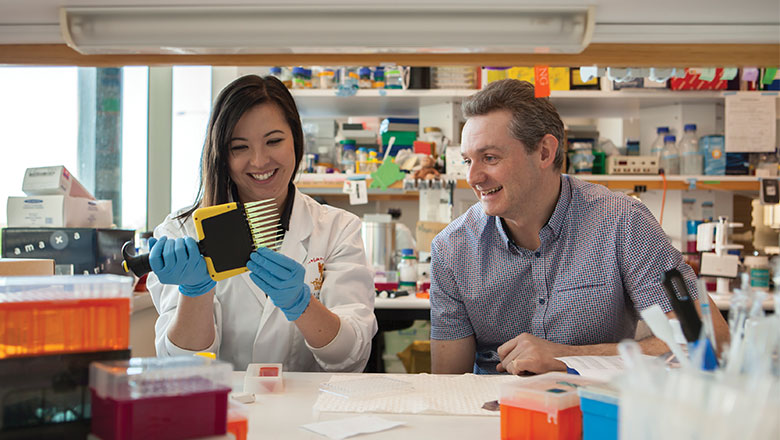Search

News & Events
Global war on brain cancerDr Nick Gottardo and Dr Raelene Endersby from The Kids Research Institute Australia are the driving force behind an innovative, global action group on child brain cancer.
Research
LeukaemiaLeukaemia, also spelled leukemia, is a cancer that develops in the bone marrow and results in abnormal white blood cells. It is the most common cancer in children, accounting for almost a third of all childhood & teen cancers.
Research
Antigen reactivity defines tissue-resident memory and exhausted T cells in tumorsCD8+ T cells are an important weapon in the therapeutic armamentarium against cancer. While CD8+CD103+ T cells with a tissue-resident memory T (TRM) cell phenotype are associated with favorable prognoses, the tumor microenvironment also contains dysfunctional exhausted T (TEX) cells that exhibit a variety of TRM-like features.
Research
Abdominal Imaging at Initial Diagnosis and Following Relapse in Children With Acute Lymphoblastic LeukaemiaAcute lymphoblastic leukaemia (ALL) is the most common paediatric malignancy and remains one of the most common causes of cancer-related death in children and adolescents. It is characterised by the proliferation of immature lymphoid cells capable of infiltrating bone marrow, blood and extramedullary sites. Five-year overall survival rates exceed 90% with current multidrug chemotherapeutic regimens. This manuscript reviews the abdominal imaging features of leukaemic infiltration in children with ALL at the time of initial diagnosis and following relapse.
Research
Histone methyltransferase PRDM9 promotes survival of drug-tolerant persister cells in glioblastomaChemotherapy often kills a large fraction of cancer cells but leaves behind a small population of drug-tolerant persister cells. These persister cells survive drug treatments through reversible, non-genetic mechanisms and cause tumour recurrence upon cessation of therapy. Here, we report a drug tolerance mechanism regulated by the germ-cell-specific H3K4 methyltransferase PRDM9.
Research
Beyond bone: the emerging role of osteoclasts in immune regulation, leukemia development and following myeloablative therapyOsteoclasts are important regulators of bone remodeling, with an established role in maintaining skeletal homeostasis. The emergence of osteoimmunology has identified osteoclasts as key players in the immune system. In particular, osteoclasts can initiate bi-directional crosstalk mechanisms with hematopoietic stem cells and various immune cells, such as T cells, B cells and NK cells, to influence hematopoiesis and inflammatory response.
Research
A New Era for PPARγ: Covalent Ligands and Therapeutic ApplicationsPeroxisome proliferator-activated receptor γ (PPARγ) is a prominent ligand-inducible transcription factor involved in adipocyte differentiation, glucose homeostasis, insulin sensitivity, inflammation, and cell proliferation, making it a therapeutic target for diabetes, metabolic syndrome, autoimmune diseases, and cancer.
Research
IDH mutant high-grade gliomasGliomas are the most common type of malignant primary central nervous system (CNS) tumors, resulting in significant morbidity and mortality in children and adolescent and young adult (AYA) patients. The discovery of mutations in isocitrate dehydrogenase (IDH) genes has dramatically changed the classification and understanding of gliomas. IDH mutant gliomas have distinct clinical, pathological, and molecular features including a favorable prognosis and response to therapy compared to their wildtype counterparts.
Research
Tumor site-directed A1R expression enhances CAR T cell function and improves efficacy against solid tumorsCitation: Sek K, Chen AXY, Cole T, Armitage JD, Tong J, ……… Waithman J, Parish IA, et al. Tumor site-directed A1R expression enhances CAR T cell
Research
Long-Term Outcome of Young Infants With Suspected Neuroblastoma following Observation as Primary Therapy: A Report From the Children's Oncology GroupSeveral studies have established that patients with localized perinatal neuroblastoma can be safely observed; however, long-term outcomes have not been previously reported. We evaluated long-term outcomes of infants with suspected perinatal neuroblastoma enrolled on the Children's Oncology Group ANBL00P2, which included an expectant observation approach.
